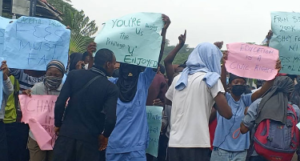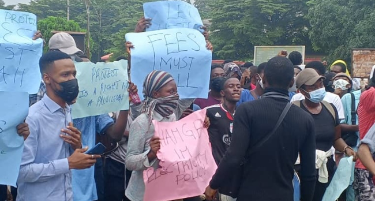Students of the University of Ibadan (UI) have taken to the streets to express their dissatisfaction with the recent decisions made by the university management, particularly concerning electricity supply and fee hikes. The protest, which began late on Tuesday, continued with increased momentum on Wednesday, as students gathered in large numbers, holding placards and voicing their grievances at the university’s main gate.
On Wednesday, the students’ determination was evident as they barricaded the main entrance of the university, effectively halting vehicular movement into the campus. This act of civil disobedience underscored their frustration and their demand for immediate attention to their concerns.
During a visit to the university, it was clear that the protest had garnered significant support among the student body. Many students were seen carrying placards with various inscriptions highlighting their demands and concerns. They had taken to sitting on the access road leading to the main gate, a symbolic gesture to block entry and draw more attention to their plight.
The atmosphere was charged with chants and songs as another group of students gathered on the premises of Trenchard Hall, one of the university’s iconic buildings. The air was filled with the sound of protest songs, a testament to the unity and solidarity among the students. These chants served as a powerful reminder of the students’ resolve to see their issues addressed.
The core issues at the heart of the protest include the management’s handling of electricity supply, which has been erratic and unreliable, causing significant inconvenience to students. The students also expressed their discontent with the recent hike in fees, which they argue places an undue financial burden on them and their families.
 The fee hikes have been particularly contentious, as many students and their families struggle to afford the increased costs. This financial strain is compounded by the unreliable electricity supply, which hampers students’ ability to study and complete their academic work efficiently. The combination of these issues has led to growing frustration and a sense of neglect among the student body.
The fee hikes have been particularly contentious, as many students and their families struggle to afford the increased costs. This financial strain is compounded by the unreliable electricity supply, which hampers students’ ability to study and complete their academic work efficiently. The combination of these issues has led to growing frustration and a sense of neglect among the student body.
In addition to these primary concerns, the students also raised other issues related to the overall management of the university. They called for greater transparency and accountability in decision-making processes and urged the university administration to engage more actively with the student community to understand and address their needs.
The protest at the University of Ibadan is a reflection of broader challenges faced by students across Nigeria, where issues such as fee hikes, poor infrastructure, and inadequate support services are common. This protest highlights the urgent need for university administrations and government authorities to address these systemic issues and ensure that students have access to a conducive learning environment.
As the protest continues, there is a growing call for dialogue between the university management and the student representatives. Many believe that open communication and a willingness to address the students’ concerns are essential steps toward resolving the current impasse. The students have expressed their readiness to engage in discussions, provided their grievances are taken seriously and addressed in a timely manner.
In conclusion, the ongoing protest by University of Ibadan students is a significant demonstration of their collective frustration and determination to seek justice and fair treatment. The issues of electricity supply and fee hikes are at the forefront of their demands, but their call for better management and accountability resonates with a broader call for systemic change in Nigeria’s higher education sector. The resolution of these issues will require genuine commitment and collaboration from both the university administration and the government to create a more supportive and equitable environment for all students.




